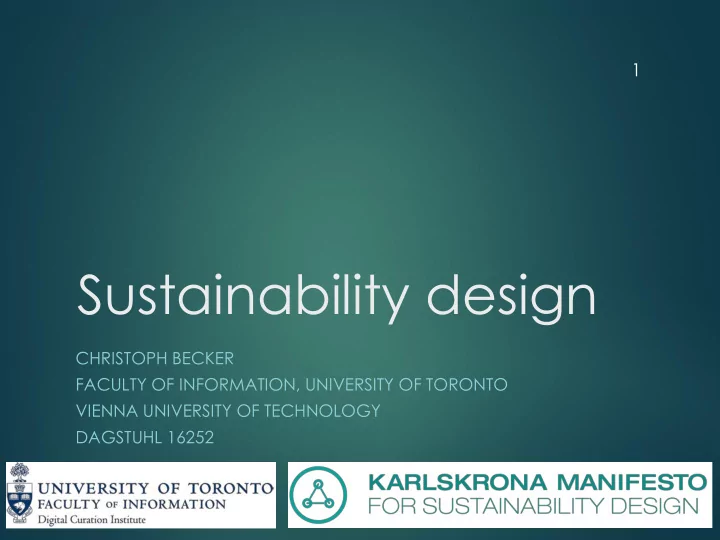

1 Sustainability design CHRISTOPH BECKER FACULTY OF INFORMATION, UNIVERSITY OF TORONTO VIENNA UNIVERSITY OF TECHNOLOGY DAGSTUHL 16252
Sustainability design 2 Software increasingly central to the fabric of societies and industries Opportunities and goodwill, but few good outcomes Initiative started at Requirements Engineering for Sustainable Systems workshop, RE4SuSy 2014, following a suggestion in a position paper Aim to provide a common ground for thinking about sustainability in systems design across disciplines related to software http://sustainabilitydesign.org/who-we-are/
https://prezi.com/ouepmpcniehi/sustainability-design-icse2015-software- engineering-in-society/ Sustainability 3
Selected (mis)perceptions & practices 4 • Sustainability as environmental or financial Individuals • Sustainability as separate from software engineering • Sustainability as a nice-to-have quality • Lack of methodological support Professional • Roles & responsibilities of customers, engineer & managers environment • Management support • Assumed costs and perception of trade-off Norms in • Project success assessed at delivery only engineering • Poor communication of sustainability values • Regulations are drivers for sustainability practice Chitychyan, Becker et al (2016). Sustainability Design in Requirements Engineering: Theory and Practice. ICSE SEIS 2016
Betz et al. Sustainability Debt: A Metaphor to Support Sustainability Design Decisions . RE4SuSy 2015 Becker et al. Requirements: The Key to Sustainability . In IEEE Software special issue: The Future of Software Engineering, January 2016
The sustainability debt of most systems remains undiscovered. Betz et al. Sustainability Debt: A Metaphor to Support Sustainability Design Decisions . RE4SuSy 2015 Becker et al. Requirements: The Key to Sustainability . In IEEE Software special issue: The Future of Software Engineering, January 2016
Sustainability design 7 Strive to advance not just technical and economic, but also social, individual and environmental goals simultaneously Need for new approaches: Context long-term interactions socio-technical Need to counter pervasive misperceptions 11 misperceptions and counterpoints Becker et al (2015). Sustainability design and software: The Karlskrona Manifesto. ICSE’2015 . http://dl.acm.org/citation.cfm?id=2819009.2819082
11 misperceptions and 8 counterpoints such as… There is a tendency to focus on the immediate effects of a new system in terms of its functionality and how it is used. Whereas the following orders of effects have to be distinguished: Direct , first order effects are the immediate 1. opportunities and effects created by the physical existence of a system and the processes involved in its design and production. Enabling , second order effects are the 2. opportunities and effects arising from its application and usage. Structural , third order effects, finally, are aggregate 3. effects from wide-scale use of a system over time. Adapted from Karlskrona Manifesto, http://www.sustainabilitydesign.org/karlskrona-manifesto/
9 Requirements set the foundation for the impact of systems. Sustainability Design Requires an appreciation of ‘ wicked problems ’ in systems design favors integrated understanding over a divide-and- conquer approach to systems analysis. Requirements: The Key to Sustainability. In IEEE Software special issue: The Future of Software Engineering, January 2016
Decision gates 10 Project purpose System boundary scoping Stakeholder identification Requirements elicitation Success criteria definition …. Requirements: The Key to Sustainability. In IEEE Software special issue: The Future of Software Engineering, January 2016
Challenges 11 Barriers on individual, business & disciplinary levels Discourse reveals Reductionist perspective Solutionist mindset Techno-determinism Misperceptions & blind spots Assumptions about the engineering process
Who can help? 12 Socio-technical systems Social informatics Values in design Behavioural economics … … … Critical Systems Thinking Social Construction of Technology …
What can we do? 13 The conceptual toolset of SW engineering is inadequate for understanding what we normally call "software sustainability" We've barely begun to articulate, within the engineer community, some thoughts about sustainability design SD requires a paradigm shift, but the engineering community is unlikely to get that shift going. SSH research has commonly remained in a position of critique SSH needs to engage - constructively . Interesting threads exist, but most either on macro-level (“the bicycle”) or micro - level (one person’s experience ).
What do I plan to do? 14 I'm interested in empirical research that helps us understand what exactly is happening when people take trade-off decisions between current & future benefits in software projects Case studies of systems design projects 1. Understand path-dependent decision making Question assumptions about trade-off decisions Identify leverage points for intervention Tools to make sustainability debt visible 2. Action Research with software teams 3. use that insight to develop design methods and tools to support more responsible choices, and translate that into practice
15 www.sustainabilitydesign.org dci.ischool.utoronto.ca christoph.becker@utoronto.ca @ChriBecker
Recommend
More recommend